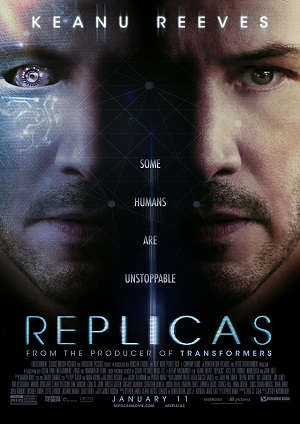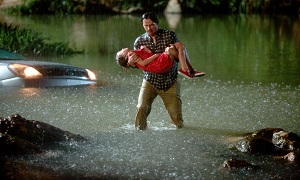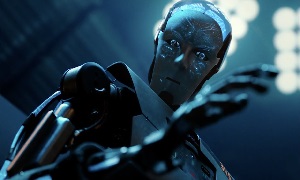Replicas

 “Playing God always leads to successful results” – No One Ever.
“Playing God always leads to successful results” – No One Ever.
Cast of Characters:
William Foster – Keanu Reeves
Mona Foster – Alice Eve
Ed Whittle – Thomas Middleditch
Jones – John Ortiz
Director – Jeffrey Nachmanoff
Screenplay – Chad St. John
Producer – Stephen Hamel, Keanu Reeves, Lorenzo di Bonaventura, Luis A. Riefkohl, Marc Gao
Rated PG-13 for thematic material, violence, disturbing images, some nudity and sexual references.
William Foster (Keanu Reeves) is a research neuroscientist, who has been tasked by his company Bionyne to lead an experiment that would map neural pathways from deceased donors into synthetic bodies. Despite some progress, the experiment still keeps hitting dead ends for Foster, which naturally upsets his boss Jones (Jones), who fears investors will pull out of the project if results are not made soon.
Frustrated at getting so close only to fall short, Foster sets out for a much-needed vacation with his family – wife Mona (Alice Eve), and children Sophie (Emily Alyn Lind), Matt (Emjay Anthony) and Zoe (Aria Leabu). However, a rainy drive on the way to their destination leads to a car crash that kills everyone but William.
Yep, I see where this is going.
After grieving for about two seconds over the horrific loss of his entire family, William calls on his friend and coworker Ed Whittle (Thomas Middleditch), an expert scientist in human cloning, and asks for his help to combine their two technologies in order to bring his family back. Ed will provide the clones and William will transplant their minds into their new host bodies.
Of course, nothing but consequence-free good can come out of this.
 Ever since Mary Shelley first introduced us to Frankenstein’s monster, audiences have grown a fascination with death and resurrection. For better or worse, that fascination has been a go-to theme for both the sci-fi and horror genres. At best, they’ve provided strong examinations of man’s obsession with mortality and the consequences that come when they attempt to upset the natural order of things, Ex Machina being a great example in recent years. At worst, it’s I, Frankenstein or The Lazarus Project.
Ever since Mary Shelley first introduced us to Frankenstein’s monster, audiences have grown a fascination with death and resurrection. For better or worse, that fascination has been a go-to theme for both the sci-fi and horror genres. At best, they’ve provided strong examinations of man’s obsession with mortality and the consequences that come when they attempt to upset the natural order of things, Ex Machina being a great example in recent years. At worst, it’s I, Frankenstein or The Lazarus Project.
Replicas is the newest film to tackle these themes, and leading the quest to play God this time around is Keanu Reeves, who is currently riding the comeback high rewarded to him by the John Wick franchise. Of course, Reeves and sci-fi isn’t a new combination; in fact, he’s produced some of his best work in the genre with The Matrix and A Scanner Darkly… he’s also given us Johnny Mnemonic and the remake of The Day the Earth Stood Still, so… yeah, there’s that too.
 The Good: Given that Mary Shelley first popularized it about 200 years ago, Replicas isn’t exactly breaking new thematic ground here, but it nevertheless poses some fascinating questions concerning identity and memory, while also touching on the ethical implications in tampering with either. The philosophical conflict at work here is summed up during an interesting conversation between William and his wife Mona: What is it that truly makes us human? Is it nothing more than nerve impulses and brain wiring as William believes it is, or, as Mona believes, is it a soul that makes us more than what essentially sounds like a walking, talking computer? While the trailer may have suggested something more along the lines of an action-thriller, the film’s real potential is in the morality play that is at the heart of its premise.
The Good: Given that Mary Shelley first popularized it about 200 years ago, Replicas isn’t exactly breaking new thematic ground here, but it nevertheless poses some fascinating questions concerning identity and memory, while also touching on the ethical implications in tampering with either. The philosophical conflict at work here is summed up during an interesting conversation between William and his wife Mona: What is it that truly makes us human? Is it nothing more than nerve impulses and brain wiring as William believes it is, or, as Mona believes, is it a soul that makes us more than what essentially sounds like a walking, talking computer? While the trailer may have suggested something more along the lines of an action-thriller, the film’s real potential is in the morality play that is at the heart of its premise.
 The Bad: But then, after a fascinating setup, the film pretty much takes a giant dump the rest of the way. Director Jeffrey Nachmanoff, working from Chad St. John’s script, is juggling a number of interesting ideas, but neither he nor St. John put the effort in following through on any one of them, instead opting to devolve the film into an uninspired chase thriller. It’s at that point that the ethical questions raised are abandoned, and William is no longer held accountable for the highly dubious decisions he makes.
The Bad: But then, after a fascinating setup, the film pretty much takes a giant dump the rest of the way. Director Jeffrey Nachmanoff, working from Chad St. John’s script, is juggling a number of interesting ideas, but neither he nor St. John put the effort in following through on any one of them, instead opting to devolve the film into an uninspired chase thriller. It’s at that point that the ethical questions raised are abandoned, and William is no longer held accountable for the highly dubious decisions he makes.
Maybe, and I’m being far too generous by giving this steaming turd a maybe, if the action delivered, you could overlook Nachmanoff and St. John’s decision to ignore the script’s far more meaningful elements, however disappointing it would be for them to do so. The problem is that the action is so half-baked and the twists and turns so ludicrous that everything ends up falling flat. The action fails to excite and the philosophical components wind up getting lost in the shuffle.
Even more damning, for being a top neuroscientist charged with heading a groundbreaking, earth-shattering experiment, it’s pretty amazing how dumb William really is. Forgetting to dispose of every remnant of the child you were unable to resurrect? Check. Just flat-out telling his wife she’s a clone without the slightest bit of hesitation or attempt at a coverup or worry about how she would react? Check. Being completely oblivious to the fact that his giant company would clearly have security protocols that would alert the higher-ups of him stealing God knows how many millions of dollars worth of cloning equipment and hiding it in his home? Check. Forgetting to erase the traumatic car crash from his family’s memories, and then, when the light bulb clicks on, just going in and deleting them like it’s simply backspacing a typo in a Word document? Check. For a premise that poses many questions regarding the marriage of science, technology and morality, they’re all unfortunately overshadowed by one bigger question: How could somehow supposedly so brilliant be so much of a dumb-ass?
Keanu may be giving it the old college try, but there’s little he can do to elevate this character above his level of stupidity. Yeah, I get Keanu himself doesn’t exactly scream neuroscientist either, but even Theodore “Ted” Logan deserves better.
What wins the top stupid prize, however, is a pivotal moment when William is forced to choose which of his four family members to not bring back to life due to Ed telling him there are only three cloning pods. Yes, only three pods, despite the fact that there’s practically a Costco bulk section of them just sitting back at the lab. A decision of this magnitude should be soul-crushing for William, but what’s intended to be an extremely unsettling moment will only end up producing unintended laughter from the viewer when they see how William goes about making his decision. Quite frankly, the film would’ve carried a more poignant, gut-wrenching punch had he have used a cootie catcher or Magic 8-Ball to decide.
Then again, he did appear to move on quite well from his family’s death literally as he’s carrying their lifeless bodies from the wrecked car, so maybe the decision was Easy Peasy Lemon Squeezy for him?
 The Ugly: While not all the CGI effects are bad, namely the effects used to visualize the neural mapping sequences, when they are bad, they’re quite terrible. One need look no further than the cheap-looking robot, who’s name I believe is McGuffin, for answers regarding the studio’s budgetary limits and why it’s so noticeably absent from the trailer. I guess it’d be fair to point out that Nachmanoff doesn’t rely heavily on CGI, but that still doesn’t take away the poorly-rendered robot design, which borders close to Syfy movie level bad effects.
The Ugly: While not all the CGI effects are bad, namely the effects used to visualize the neural mapping sequences, when they are bad, they’re quite terrible. One need look no further than the cheap-looking robot, who’s name I believe is McGuffin, for answers regarding the studio’s budgetary limits and why it’s so noticeably absent from the trailer. I guess it’d be fair to point out that Nachmanoff doesn’t rely heavily on CGI, but that still doesn’t take away the poorly-rendered robot design, which borders close to Syfy movie level bad effects.
But, hey, at least it’s got that push for a sequel during the coda. And for a movie that received very little to no push from the studio, even by crappy January movie standards, why not? Go for it.
Consensus: Replicas flirts with a couple of intriguing ethical dilemmas, but any promise found in them is ultimately wasted by milquetoast direction and a script that bounces back and forth between unintentionally hilarious and outright idiotic.
Silver Screen Fanatic’s Verdict: I give Replicas a D (★).
